Pulmonary and Critical Care Medicine
Fellowship Program
Training expert clinicians and academic physicians
Welcome to the Vanderbilt University Medical Center Pulmonary and Critical Care Medicine Fellowship Training Program. The goal of our fellowship is to produce expert clinicians with exceptional research training in order to prepare our graduates to be academic physicians.
Vanderbilt is currently ranked in 12th in NIH funded universities and our Department of Medicine is among the top programs nationally for NIH research funding. Our division of Pulmonary and Critical Care Medicine division faculty lead a variety of clinical and research programs that create a strong training environment for our fellows.

Watch the video to learn more about the VUMC Pulmonary and Critical Care Medicine Fellowship Program.
Program Overview
We accept six fellows per year in the three-year Pulmonary and Critical Care Fellowship Program, and offer additional fellowship training as needed to develop academic careers. We do not have designated tracks in our fellowship program but customize training to meet the career goals of our fellows and have great success in helping fellows realize research-focused and clinically-focused careers.
About half of our fellows elect to complete a fourth year of research and/or subspecialty clinical training, and we allow considerable flexibility for training during fellowship in subspecialty areas of pulmonary depending on a fellow’s individual career goals. In the second and third years, fellows receive intensive training in clinical and/or basic biomedical research under the guidance of a faculty mentor and oversight by a research advisory committee. Clinical training during the second and third years occurs during MICU rotations and during continuity and specialty clinics.
Fellows at Vanderbilt have in-depth training in pulmonary and critical care medicine at our two training sites – VUMC and the Nashville VA Medical Center, which are physically connected on one campus.
The first year of the program is focused on clinical medicine and patient care.
Year 1:
In July and August of the first year, fellows participate in our “Jumpstart Series” with dedicated hands-on workshops in airway management, bronchoscopy and pleural procedures, and critical care ultrasound. A series of didactic sessions on high-yield topics help get fellows up to speed on key areas of our practice such as asthma, COPD, reading chest radiology, pulmonary hypertension, and lung transplantation.
There are six core clinical rotations in the first year and fellows rotate through each in two-week blocks:
VUMC pulmonary consults: Along with the pulmonary consult attending physician, fellows see all inpatient pulmonary consults from all services at VUMC and perform any necessary diagnostic or therapeutic procedures including bronchoscopy, thoracentesis, chest tube placement, and thoracic ultrasound. There is no night call on this service.
VUMC subspecialty pulmonary inpatient: Fellows work with a pulmonary attending and internal medicine residents to evaluate and manage patients on the inpatient pulmonary service. This service includes patients with a variety of pulmonary diseases including post-ICU pulmonary disease, cystic fibrosis, pulmonary hypertension, and interstitial lung disease.
The fellow on this service works with the VU consult fellow to evaluate pulmonary consults and perform procedures for inpatients at VUMC during times of high consult volume.
VUMC subspecialty pulmonary outpatient: On this rotation, fellows work alongside subspecialty faculty to evaluate new consultations and established patients in the CF, PH, lung transplant, ILD, sarcoidosis, neuromuscular disease, and rare lung disease clinics. VA consult/bronchoscopy service.
VA Medical Intensive Care Unit (MICU)/consult service: The fellow works with the PCCM attending physician and medical housestaff to provide care for critically ill patients in the combined medical/cardiac ICU at the VA. Fellows evaluate and manage patients, teach and supervise residents, and perform necessary diagnostic or therapeutic procedures including endotracheal intubation, management of mechanical ventilation, bronchoscopy, thoracentesis, and central vascular access. Along with the VA consult fellow, the MICU fellow provides coverage and support for the rapid outpatient pulmonary evaluation clinics.
Alongside the VA consult attending physician, fellows perform consultation on inpatients with pulmonary disease and evaluate urgent outpatient pulmonary referrals. The fellow works with general pulmonary and IP faculty to perform bronchoscopy (including navigation and EBUS).
VU Medical Intensive Care Unit (MICU): The fellow works alongside a Pulmonary and Critical Care Medicine attending physician and medical housestaff to provide care for critically ill patients. First year fellows work alongside senior fellows for day shifts and cover one weekend per block.
Specialties ICU elective/non-pulmonary critical care: Fellows spend three months rotating through non-pulmonary ICUs at VUMC and the VA. Our fellows can rotate in the neuro ICU, burn ICU, surgical ICU, trauma ICU, and cardiovascular ICU. Additional elective exposures to chest radiology, anesthesia, ECMO and thoracic surgery are available. During these months fellows also participate in an integrated physiology curriculum focusing on pulmonary function testing, exercise physiology, hemodynamic assessment, sleep medicine, and pulmonary vascular physiology.
Call schedule:
- Night and weekend call Night call at the VA is shared between the two VA fellows
- Night call for the VU pulmonary inpatient and consult service is provided by second/third year fellows (no overnight call during the week for first year fellows)
- Weekend call for VU pulmonary inpatient is covered by PCCM faculty
- Fellows have one weekend day off per week on the VU consult service
- First year fellows in the VU MICU do not do night float coverage but do cover one long-call per rotation block in the VU MICU
- First-year fellows provide weekend coverage in the VUMC MICU during their VU months (inpatient/consults and specialties)
Years 2 and 3:
Each fellow spends three-four months in the VUMC Medical Intensive Care Unit. Two fellows are present during the day and one senior fellow is present as the night float fellow. This high acuity, 35-bed ICU provides fellows with exposure to acutely critically ill patients from a wide referral area.
Fellows oversee the two teaching and one non-teaching MICU teams, under the supervision of dedicated pulmonary and critical care faculty members. Fellows evaluate and triage MICU patients, develop management plans, conduct daily teaching rounds with the attending, and teach and supervise housestaff along with the attending. With faculty supervision, the fellow performs or assists housestaff with all necessary procedures including endotracheal intubation, ventilator management, arterial catheter and central venous catheter insertion, pulmonary artery catheterization, thoracentesis, chest tube insertion, lumbar puncture, paracentesis, and bronchoscopy.
Fellows help develop and deliver the MICU core curriculum for the housestaff in the MICU, which covers key topics in critical care medicine. Night coverage is provided by a night float fellow with day fellows providing one overnight shift per block.
Procedural training: Fellows begin fellowship training with workshops using simulation and cadaver-based training to teach basic bronchoscopy, pleural procedures, airway management, and critical care ultrasound. Throughout fellowship, our fellows generally complete between 100-150+ bronchoscopies, with over half of these including EBUS and navigational techniques.
Fellows perform endotracheal intubation in the MICU, including direct laryngoscopy and video laryngoscopy. During pulmonary consult and IP rotations there is extensive training in thoracic ultrasound, thoracentesis, chest tube placement and tunneled pleural catheter placement.
Ambulatory Pulmonary Clinics: All fellows have a half day per week in continuity clinics at Vanderbilt or the VA Hospital in which they follow patients for the duration of their fellowship under the supervision of a core group of faculty attending physicians. The focus of the outpatient ambulatory pulmonary clinic is in evaluation and management of patients with general pulmonary diseases and symptoms (asthma, COPD, interstitial lung disease, dyspnea, cough, pleural effusions, lung nodules, abnormal chest imaging). In years two and three (and during the optional fourth year), fellows have the opportunity to participate in sub-specialty pulmonary clinics to enhance their training in these fields.
Below is a list of some of the sub-specialty centers/clinics available in our program:
Adult cystic fibrosis clinic: This is designed to give exposure to the outpatient management of adult patients with CF including standard outpatient care, care of the deteriorating patient, indications and evaluation for lung transplantation, and engagement in clinical trials.
COPD Clinic: This clinic is a collaborative effort between pulmonary and thoracic surgery where patients are evaluated for advanced COPD therapies, clinical trials, and bronchoscopic and/or surgical interventions.
ICU Recovery Clinic: This multispecialty clinic is an innovative and collaborative practice that is focused on the management of patients who have survived critical illness. This clinic is staffed by Dr. Carla Sevin as well as members of our MICU NP team, pharmacy, and psychology.
Interstitial Lung Disease Center sees patients with a variety of ILDs including IPF, connective tissue disease, and other idiopathic interstitial diseases. This clinic is actively engaged in clinical trials and an interdisciplinary team helps care for this complex patient population.
Interventional Pulmonary Clinic is housed in the Thoracic Oncology Clinic and evaluates patients with tracheal disease and pleural and parenchymal lung diseases before and after advanced bronchoscopic procedures (rigid bronchoscopy, airway stents, cryobiopsy), pleural effusions and complex pleural disease, management of pleural catheters, and lung nodule evaluation.
Lung Transplant Program includes evaluation pre-transplantation and post-transplant care. This clinic is staffed by transplant pulmonologists and highly trained transplant NPs. Fellows have exposure to indications for and evaluation for lung transplantation, management of immunosuppression, and post-transplant complications.
Neuromuscular Pulmonary Disease Clinic: This once-monthly collaborative clinic with Neurology evaluates patients with pulmonary manifestations of neuromuscular disease including patients with ALS, muscular dystrophy, and other conditions requiring home ventilator support.
Occupational Lung Disease Clinic evaluates patients with all types of parenchymal and airway disease related to occupational exposures.
Pulmonary Vascular Clinic provides evaluation for patients with known or suspected pulmonary hypertension and vascular disease including pulmonary arterial hypertension, congenital heart disease, and chronic thromboembolic pulmonary hypertension.
This large referral practice has extensive experience will all forms of PH therapy and is actively involved in clinical trials for novel PAH therapies. We have an active surgical program for CTEPH.
Sleep Disorders Pulmonary Center sees patients with sleep disorders including insomnia, narcolepsy, restless leg syndrome and sleep apnea. Fellows can work alongside pulmonary faculty who are also board-certified in sleep medicine to diagnose and treat these patients.
The depth and breadth of opportunities for research and scholarly activity in our division affords each fellow the opportunity to customize their research to develop their academic career. In years two and three, all fellows have eight months of protected time for scholarly activity and research. With input from program leadership, the Director of Fellowship Research, and faculty research mentors, fellows devise a plan for this training that best fits their own personal career goals.
For fellows interested in a career as a physician-scientist, we have three training grants (T-32) in the division, and numerous opportunities outside the division, to allow for additional 12 months of research training in a fourth year of fellowship. Approximately half of our fellows elect to pursue this additional research training, and many of them utilize this time to complete advanced degrees available through the Vanderbilt University School of Medicine, including the Master of Science in Clinical Investigation (M.S.C.I.) or Master of Public Health (M.P.H.) programs.
What types of research opportunities exist at VUMC for fellows?
We are committed to helping our fellows develop the skills necessary for their future academic career, and we support varied paths for research and clinically focused careers. The division performs basic and clinical/translational research in the fields of lung injury, interstitial lung disease, pulmonary vascular disease, asthma, lung cancer, ARDS, sepsis, and delirium. VUMC faculty are leaders in the Pragmatic Critical Care Research Group and fellows in our division participate in these trials.
How are fellows supported in research and scholarly activity?
Dr. Jonathan Kropski serves as the Director of Fellow Research and in this role, he helps oversee career development of fellows alongside fellowship program leadership.
Year 1:
Throughout the first year of clinical training fellows are exposed to ongoing research performed by division faculty and co-fellows. This occurs through Pulmonary Grand Rounds and Friday Research Conference series. During the first year, faculty host a Research Highlights Forum, where faculty with ongoing research present their active research and discuss opportunities for fellows to join their team. With the help of Program Leadership and mentors, fellow trainees choose a research mentor and a research project before the first year ends.
Years 2 and 3:
Fellows dedicate themselves to individual research projects, spending roughly eight months per year dedicated to research training. During the first month of the second year, each fellow participates in an introduction to research course which orients them to research techniques including basic experimental design and conduct, record keeping, biostatistical analysis, scientific writing and ethical scientific conduct. During the second year, a formal career plan is developed by the trainee, mentor, and the research/career advisory committee to guide the trainee to a successful academic career.
For fellows interested in a clinically-focused career, the third year of fellowship offers the opportunity to obtain additinal specialty clinical training, to engage in more dedicated educator training and teaching opportunities, and to complete scholarly work. Fellows interested in a research-focused career are encouraged to apply for a T32 to support additional research training in a fourth year.
VUMC has a robust infrastructure for basic science, clinical, and medical education research, and VICTR is one of the ways that many fellows and junior investigators obtain pilot funding support.
Our division has a strong track record of successful career development award applications and every fellow who has applied for a K (or equivalent) award in the last eight years has been awarded grant funding.
Some examples of current fellows' research:
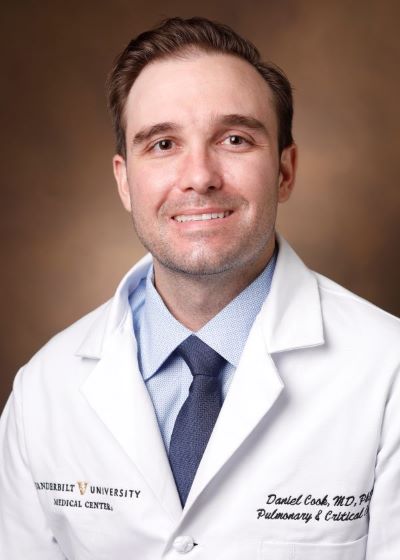
Fellow: Dan Cook, MD, PhD
Career Goal: Physician scientist focused on mechanisms of T cell-dependent inflammation in cystic fibrosis
Fellowship Training after Year 1:
- Wet lab protected time
- Grant writing and manuscript preparation workshop participation
- Weekly CF clinic participation
Special Experiences:
Regional and international CF and immunology conference attendance
Research Success Seminar attendance
Workshop Chair for International CF conference
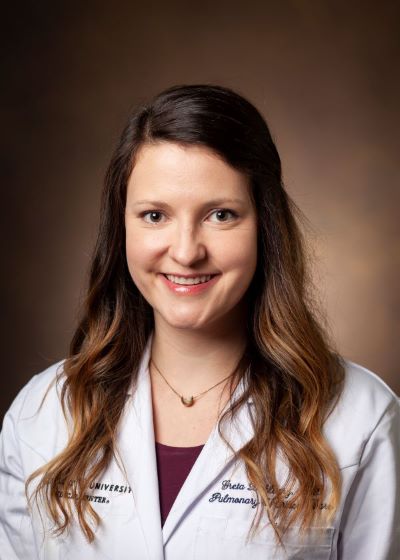
Fellow: Greta Dahlberg, MD
Career Goal: Clinician educator improving care of patients at risk for and with lung cancer, including complications of other malignancies
Fellowship Training after Year 1:
- Clinic experience: lung nodule, thoracic surgery, medical and radiation oncology
- Three months procedure time in third year
Special Experiences:
Thoracic oncology tumor board attendance
Development of educational activities for fellowship bronchoscopy and procedural training
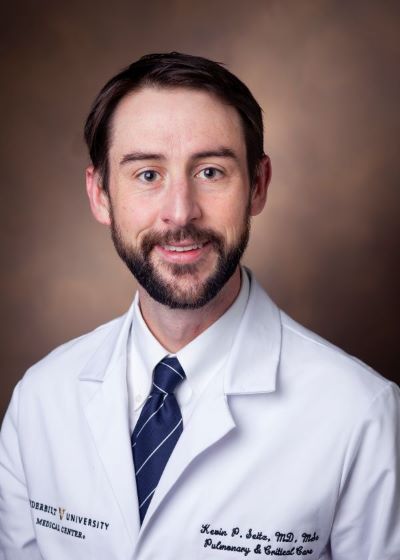
Fellow: Kevin Seitz, MD, MSc
Career Goal: Physician scientist designing and conducting pragmatic trials in critically ill adults.
Fellowship Training after Year 1:
- Completion of pilot study of mechanical ventilation modes in ICU
- Hands on training in clinical trials with mentors
Special Experiences:
- ECMO rotation
- Intensive invasive pulmonary hemodynamics experience
- Weekly seminars in VA Quality Scholars Program, Vanderbilt Center for Clinical Quality and Implementation research (CCQIR)
Our fellows are known as outstanding teachers and educators throughout Vanderbilt University Medical Center, and we place a strong emphasis on developing educator skills during fellowship through our divisional conferences and various opportunities for teaching in the residency and medical school programs.
A longitudinal critical care and pulmonary didactic curriculum runs throughout all years of fellowship training, and fellows actively participate in divisional research conferences and journal clubs.
Promotion of fellow education through attendance of divisional conferences as well as national conferences is an important part of our training program. Read below to review information about our specific divisional conferences that fellows attend.
Pulmonary Grand Rounds: This weekly conference is a showcase for faculty research in pulmonary and critical care medicine. The conference features our own faculty research as well as speakers from other divisions and departments within VUMC and from other institutions.
PCCM Fellow Jumpstart: This six-week series runs July to August and includes hands-on workshops and didactic training on high yield topics important for the start of the academic year.
PCCM Fellow Academic Half Day: Our core curriculum is housed in this biweekly time dedicated to education and training. These sessions include core curriculum didactics, board review, journal club, simulation, career development sessions and hands-on training. Speakers include division faculty and multiple faculty experts from other divisions in VUMC.
Critical Care ultrasound conference/curriculum: Fellows meet in the MICU every two weeks to practice hands-on key skills in critical care ultrasound under supervision of divisional faculty and our EM-US trained faculty. Quarterly image interpretation sessions during the core curriculum conference also supplement skills in image evaluation and interpretation for common ICU ultrasound pathologies.
Chest conference: This weekly conference includes presentations of interesting radiographic findings and clinical cases.
All applications must be received through the ERAS system. We begin reviewing applications when ERAS opens in July. All application materials must be received by August 1. For the 2025 application cycle, our initial interview invitations will be sent the beginning of August. After this date, additional interviews will be extended on a case-by-case basis. We conduct interviews virtually in late August, September and October.
In general, we do not accept applicants from non-U.S. internal medicine programs and due to our NIH training grant funding, generally cannot accept applicants on H1-B and J-1 visas (although exceptional applicants may be considered on a case by case basis). We participate in the NRMP fellowship match.
Applications should include:
- ERAS common application form
- USMLE Step 1, 2, and 3 scores as available
- At least 3 letters of recommendation - one of which must be from Internal Medicine Program Director or designee
- Personal statement
- Photo (optional)
Program Signaling:
For the 2025 recruitment season, our program will be receiving program signals within ERAS. While we preferentially review applications from those who signal our program, we also consider applicants who do not signal us.
Interviews:
In alignment with the Association of Pulmonary and Critical Care Medicine Program Directors (APCCMPD), our national professional society, and to ensure a uniform interview process that is equitable to all applicants, our fellowship interviews for applicants in 2025-2026 will be held virtually. We will not offer in-person site visits.
Applicants who are invited to interview will receive a link to a website with additional details regarding the interview day. Our interview day consists of a morning or an afternoon session where applicants meet with fellows, meet with the program director and interview with several faculty members. Applicants will attend our Pulmonary Grand Rounds during the noon (CST) hour. We will do our best to accommodate all invited applicants and ensure you get a comprehensive perspective on our program.
The Division of Allergy, Pulmonary, and Critical Care Medicine complies with and supports all policies of the Department of Medicine and University including those related to grievances, moonlighting, corrective action, and leaves of absence. Complaints by Fellows are to be directed to the fellowship program director, or division chief.
Moonlighting:
Moonlighting is permitted only with the written permission of the gellowship training program director, the division chief and the Department of Medicine. Moonlighting should not interfere with the primary mission of the fellowship-training expert clinicians and skilled research scientists.
Vacation:
Each fellow is allotted three weeks of paid vacation annually. Fellows are required to provide notice of the intent to take vacation two months in advance. Vacations are not allowed while rotating on particularly demanding selected services.
Michael Beasley
Fellowship Program Coordinator
michael.t.beasley@vumc.org
Why choose Vanderbilt for fellowship?
Clinical training at two sites on one campus
Nationally recognized research expertise in ILD, thoracic malignancies, pleural disease, pulmonary hypertension, delirium, ARDS and critical care medicine
Multiple training grants to support an optional 4th year to enhance research and subspecialty training
Collegial faculty
Nashville is a great place to live and raise a family
Invited applicants please visit this password-protected page for more information.
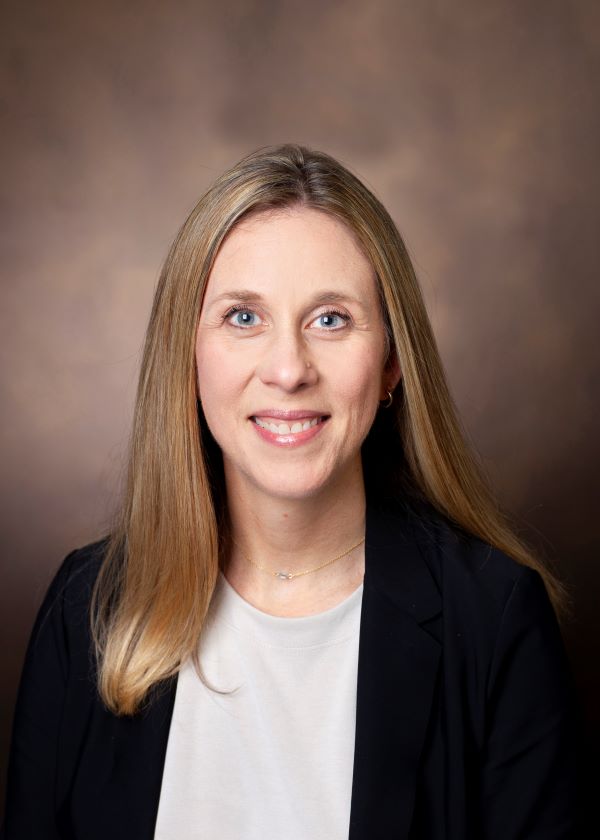
Meredith Pugh, MD, MSCI
Associate Professor of Medicine
Director, Pulmonary and Critical Care Medicine Fellowship Program
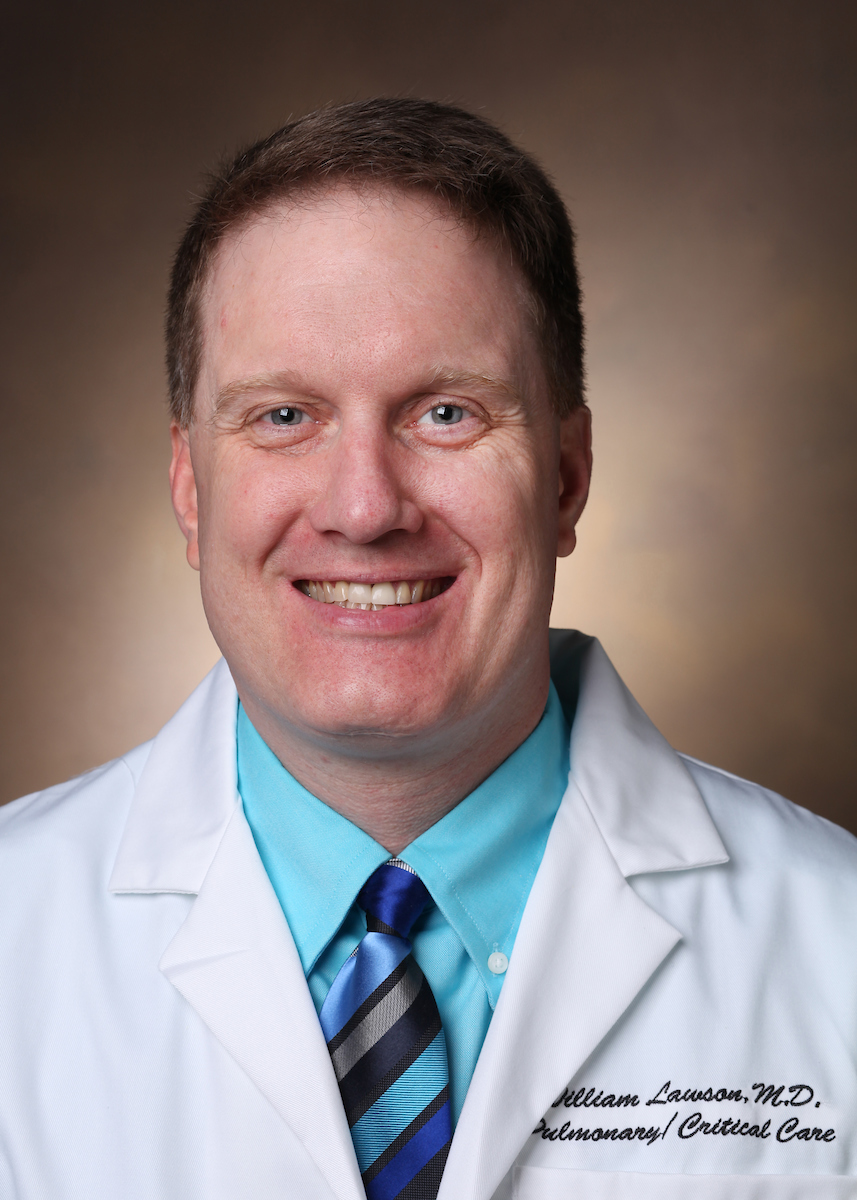
William Lawson, MD
Associate Professor of Medicine
Associate Director, Pulmonary and Critical Care Medicine Fellowship Program
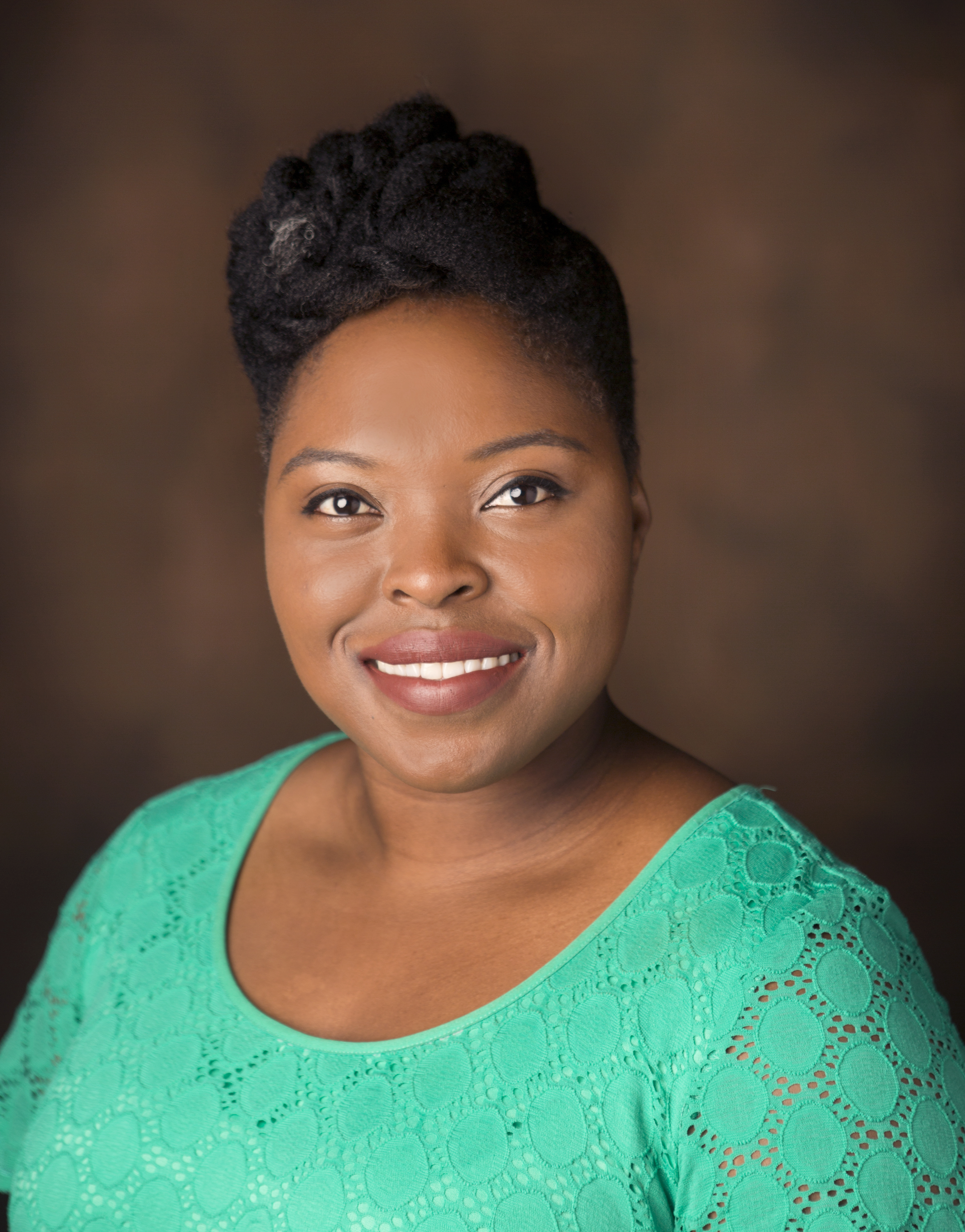
Rosemarie Dudenhofer, MD
Assistant Professor of Medicine
Associate Program Director for Ambulatory Pulmonary Education
Edward T Qian, MD
Assistant Professor of Medicine
Associate Program Director for Critical Care Education and Quality
